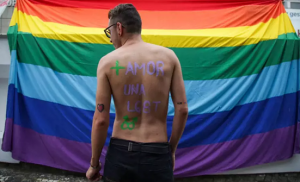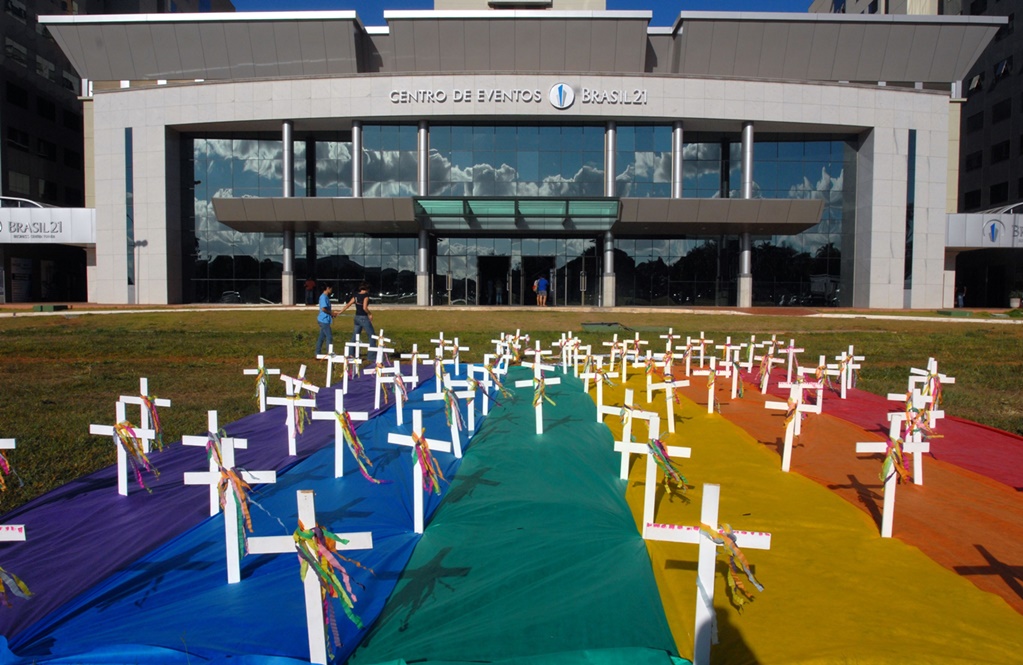WHAT THE COURTS COULDN’T FORESEE
Gender-based violence against LGBTQIAP+ people has long been a concern for Brazilians; but the year of 2018 might have revealed something else about it other than election results.
When we think about sexual orientation laws protecting LGBTQIAP+ people across the world, Brazil probably comes last on our list. Despite common assumption, Brazilian laws that recognize LGBTQIAP+ rights are actually among the most advanced in the world. In fact, Brazil’s Supreme Court recently approved the criminalization of homophobia and transphobia in 2019. One year earlier, the court had also removed medical and judicial criteria for trans* people to change their gender and name on identification documents. Earlier in 2013, the Conselho National de Justicia issued a decision approving same-sex marriage (civil unions have been legal since 2011, ndr).
 Paradoxically, the same country frequently appears as one of the most violent against LGBTQIAP+ minorities, and shows concerning data especially with regards to trans* rights. Among other violations, Brazil’s top politicians have also become notorious for their openly LGBTQIPA+phobic statements, showing the entire world it is acceptable to promote hate speech.
Paradoxically, the same country frequently appears as one of the most violent against LGBTQIAP+ minorities, and shows concerning data especially with regards to trans* rights. Among other violations, Brazil’s top politicians have also become notorious for their openly LGBTQIPA+phobic statements, showing the entire world it is acceptable to promote hate speech.
This has been of increasing concern to minorities, especially after the presidential victory of Jair Bolsonaro in 2018. Some alarming facts have come along with Bolsonaro: the re-emergence of a far right conservative agenda and alliances with politicians that date back to the military regime in Brazil. Evidently, this election brought more long-term consequences to minorities than what was reflected in poll results.
According to the organization Gênero e Número, that makes data journalism an online data for gender equity in Brazil, the promotion of anti-LGBTQIAP+ discourses by candidates was a major driver for the increase of violence against minorities. This was often justified under the pretence of freedom of speech and opinion, when in reality, we’ve seen the political arena resorting to violent and intolerant rhetoric to win the elections.
These concerns are no different on the streets. According to Grupo Gay da Bahia, who’s been annually reporting LGBTQIAP+phobic violence across the country, every 20 hours a LGBTQIAP+ person is murdered or commits suicide in Brazil. Violent threats are particularly distressing for trans* minorities: Brazil is reported as one of the top countries with the highest number of transphobic murders worldwide, according to Transgender Europe.
If violence against LGBTQIAP+ individuals in Brazil have existed for years, you might ask, what was particularly alarming about 2018’s elections? As correctly pointed out by Renan Quinalha, lawyer and activist, even if the rights achieved by minorities are guaranteed by the courts, long-term damages have already been done to the Brazilian collective thinking.
In 2018, a period ended when Brazil was committed to recognizing the rights of minorities and opening up debates about citizenship. Now, however, these discussions about issues of sexuality and gender are reduced to merely political tools based on lies like the so-called gender ideology. We have also moved from the creation of a National Truth Commission to investigate crimes committed by the state during Brazil’s dictatorship – many of them against LGBTQIAP+ minorities – to the election of candidates who might go as far as defending the military regime’s return.
 There’s no need for a degree in trauma studies to understand that it might be only a matter of time until we’d see backlashes against LGBTQIAP+ recognitions and human rights achievements. In a country where we have been avoiding confronting our dictatorial past, we might risk being bound to repeat the same atrocities we have seen 50 years ago. 2018’s elections may be considered a warning sign to show Brazil’s complicated relationship with democracy. Rather than being an exception, Bolsonaro’s hate speech and promotion of violence found their echoes in Brazilian society, revealing many red flags of what might be yet to come in the next years.
There’s no need for a degree in trauma studies to understand that it might be only a matter of time until we’d see backlashes against LGBTQIAP+ recognitions and human rights achievements. In a country where we have been avoiding confronting our dictatorial past, we might risk being bound to repeat the same atrocities we have seen 50 years ago. 2018’s elections may be considered a warning sign to show Brazil’s complicated relationship with democracy. Rather than being an exception, Bolsonaro’s hate speech and promotion of violence found their echoes in Brazilian society, revealing many red flags of what might be yet to come in the next years.
To make matters worse, Brazil has been one of the hardest hit countries by Covid-19 in 2020. Since the beginning of the pandemic, Brazil’s most important politicians seem to have adopted a highly negligent policy that overlooks and even mocks its seriousness. This is especially concerning for already vulnerable and marginalized groups, who now face the additional burden that Covid-19 represents.
LGBTQIAP+ people have faced further hardships arising from the pandemic, which in turn has exacerbated domestic physical and psychological violence, homelessness and unemployment. According to UN Brazil, social distancing efforts have not only reproduced but worsened previous exclusion and existing violence patterns against this community. Facing increased vulnerability, LGBTQIAP+ Brazilians need even more urgent public policies to address violations based on sexual orientation and gender identity stemming from Covid-19’s restrictions. This requires the difficult task of relying on a government that has done very little in guaranteeing minorities’ rights so far.
 Despite all the backlashes against the LGBTQIAP+ community in the past years, a growing resistance might show upcoming changes in the Brazilian political scenario. 2020 municipal elections were possibly the first milestone, with a record number of LGBTQIAP+ candidates elected all over the country. Particularly important is Monica Benicio’s win of a Council seat in Rio de Janeiro. She’s a lesbian, a LGBTQIAP+ and human rights activist, and she is widely known as Marielle Franco’s partner.
Despite all the backlashes against the LGBTQIAP+ community in the past years, a growing resistance might show upcoming changes in the Brazilian political scenario. 2020 municipal elections were possibly the first milestone, with a record number of LGBTQIAP+ candidates elected all over the country. Particularly important is Monica Benicio’s win of a Council seat in Rio de Janeiro. She’s a lesbian, a LGBTQIAP+ and human rights activist, and she is widely known as Marielle Franco’s partner.
Marielle Franco was an activist and an elected member in the City Council, too. She was killed by hit men in March 2018. Her murder still remains unsolved over two years later, despite striking international repercussions. In the meantime her name has circulated all around the world and Marielle Franco has become a feminist and queer symbol of the struggle for freedom everywhere.
How these changes will translate to the federal elections is still uncertain. However, resistance initiatives flourishing amid grassroots organizations and politicians might already point towards achieving a long-term goal: transforming Brazil’s political culture into one where LGBTQIAP+ can express their own minds and bodies without fear – regardless of who’s in power.
Il presente articolo è disponibile anche tradotto in italiano


Perseguitaci